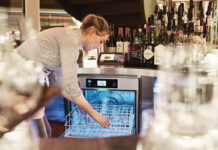
THE importance of food in today’s on-trade is hard to overstate.
For many venues it’s a core part of the offer – one of the main reasons customers come through the door – while for others it might be a way to broaden their appeal and help mitigate a drop in traditional drinks sales.
And while an extensive food menu won’t be practical for every outlet, even a limited food offer, in the words of Ray Hall, managing director at catering equipment firm RH Hall, “is likely to expand the potential customer base and encourage customers to stay for more than just one drink, increasing overall spend per head”.
However, whether it’s a microwave on the back-bar, a barbecue in the beer garden or an oven for the kitchen, it’s vital that operators choose the right tool for the job.
“Those who wish to really generate good sales need appropriate equipment for the job and the latter should be defined as feeding hungry diners quickly, with high quality food, at no pain to the catering team and with equipment that is non-temperamental,” said Karen Swift of barbecue supplier Cinders.
Those who wish to really generate good sales need appropriate equipment for the job.
She added that buying the cheapest kit available can be “a huge mistake and false economy” and advised operators to “think about the length of time across which their investment in equipment will be based and consider payback”.
This was supported by Jonathan White, marketing manager at equipment supplier Mitchell & Cooper, who said in order for any piece of equipment to be worthwhile, “both the functionality and lifetime of the equipment must be taken into consideration”.
“By using a manufacturer with a strong history, caterers can expect to reap the benefits from long-lasting and innovative equipment,” said White.
“These suppliers are also able to provide the most trusted, essential elements of the caterer’s kit; often traditional catering concepts, these particular pieces of equipment have had time spent on their development, meaning that the tried-and-tested tool is matched to the requirements of today’s operator.”
By using a manufacturer with a strong history, caterers can reap the benefits from equipment.
Similarly, it’s not advisable for operators to purchase domestic varieties of any equipment for their outlet, said suppliers, as although the lower price can be tempting, the domestic models are unlikely to be up to the strains of a commercial environment.
Hall of RH Hall said: “It is very important to choose from a commercial range of microwaves; operators shouldn’t be tempted to go down the domestic route – a domestic machine will not cope with the rigours of a professional kitchen.
“Importantly, any warranty provided with a domestic machine will also be invalid if used in a commercial environment, meaning that an operator could be faced with regular costly repairs or replacements.”
Ongoing care is an important consideration for any piece of commercial catering equipment, and operators were advised to ensure they have a warranty and service agreement in place when investing in new kit.
The supply of spare parts, service and after-sales support are critical in any buying decision.
“The supply of spare parts, service and after-sales support should be critical factors in any catering equipment buying decision,” said Malcolm Harling, sales and marketing director at Williams Refrigeration.
“They are amongst many reasons why ‘buy British’ makes good business sense.”
Harling was backed by Paul Crowley, marketing development manager at dish and warewashing specialist Winterhalter UK.
“It’s common sense to keep equipment clean and serviced,” said Crowley.
“A regular service prolongs the life of the machine but it will also reduce the likelihood of breakdowns.
“Having downtime in your bar is not something that you should be gambling on.
“It affects table turnaround, staffing and profits.
“If a machine is well looked after, serviced regularly, cleaned properly, the manufacturer’s guidelines followed and thorough training provided for staff, the lifecycle of a product should be very long indeed and it will work at optimum efficiency.”























